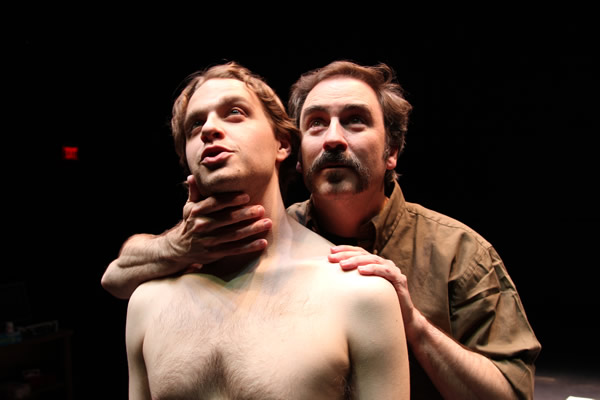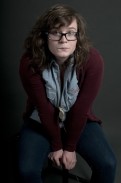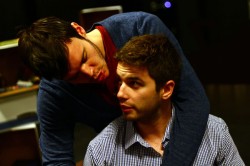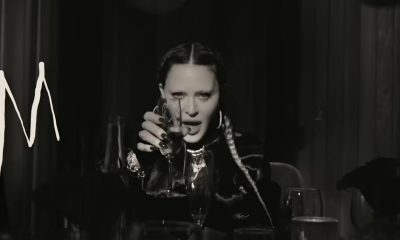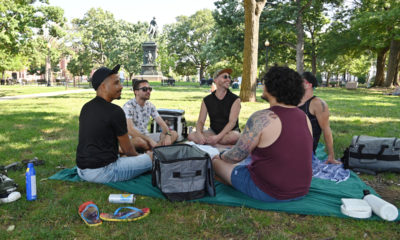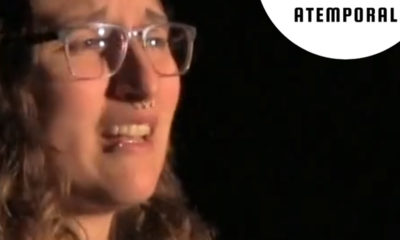Arts & Entertainment
Gays on the Fringe
Several LGBT themes among summer festival offerings
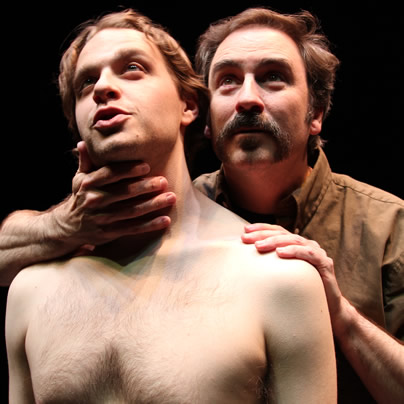
The Capital Fringe Festival opens this week (thru July 29) with about 130 shows in 15 venues. Among the eclectic mix of independent companies and performers, many are of special interest to LGBT audiences. Here are a few.
“A Fringe production’s success is greatly determined by its title,” says playwright Bob Bartlett. In past Fringe festivals, he says, his work has definitely been upstaged by more provocatively named pieces. So this year the gay playwright and director isn’t taking any chances: Bartlett has titled his entry “Bareback Ink.”
A lean two-hander especially tailored for Fringe, Bartlett’s darkly erotic play explores the unlikely relationship between a hypersexual young man called Canvas (Grant Cloyd) and a 40-something, asexual tattoo artist (DC Cathro). Bartlett describes it as a contemporary reimagining of the Ganymede myth in which Zeus violently snatches a beautiful young shepherd to join him on Mount Olympus as his lover. In Bartlett’s version, the unseen Zeus character has ordered Canvas to have an image of the rape of Ganymede tattooed on his back against his will. While most of Bartlett’s past plays have been about healing, he says, this one isn’t going in that direction.
Bartlett, who teaches theater at Bowie State University, has three tattoos of his own, two of which commemorate the death of his brother in 1991. He’s intrigued by the experience of marking one’s skin with art that can’t easily be removed, as well as the relationship that develops between the artist and customer, particularly during the arduous and week-long task of creating a full back tattoo.
The development process surrounding “Bareback Ink” (which runs at Gear Box, an intimate and appropriately grungy space above the Passenger Bar and Restaurant at 1021 7th Street, NW.), has been a little nerve wracking, Bartlett says. Do-it-yourself theater comes quickly and there’s inherent risk in that. But that’s part of Fringe’s charm. In mid-August, Bartlett and the actors are taking “Bareback Ink” to the world-famous Edinburgh Fringe Festival in Scotland.
Advance buzz says Chelsea Norment is hilarious as Graglore the troll in Red Knight Production’s comedy play “Medieval Story Land” (Studio Theatre, 1501 14th Street, NW). A familiar face at open mic nights around town, Norment (who’s gay) is also experienced in improvisation and sketch comedy, but Fringe will be her first try at a fully realized, non-sketch theatrical production.
“I thought it was time to challenge myself by learning a script and putting meaning into my character’s dialogue,” she says. “My character is a troll, so it’s surprisingly that he’s a bit of a loner. But as the action unfolds, he ends up being the glue that holds the other characters together. It’s a great part. I’m having a lot fun with it.”
Red Knight’s website describes the show as “‘Lord of the Rings’ meets Forrest Gump meets Monty Python in this fast paced parody of the medieval fantasy genre … featuring furious swordplay and a gripping plot, the show appeals not only to hobbit-loving fantasy appreciators but to anyone who likes a good story or likes to laugh.” Its 12-person cast plays more than 40 parts.
Norment, who lives in D.C. and walks dogs by day, says her stand-up act takes on her childhood and skewed vision of the world. She riffs on the differences between gender roles, specifically how growing up she never really defined her own gender. Related horror stories include tales of the gender non-specific bowl haircut she sported throughout puberty.
The newly formed Field Trip Theatre presents “Stopgap” at Mount Vernon United Methodist Church (800 Mass Ave., NW). Written by Danielle Mohlman and staged by Jamila Reddy (both straight and both recent graduates of Studio Theatre’s prestigious apprenticeship program), the two-hour comedy drama follows the growth of a prospective single mother and her best friend and his husband who strive to create family in the heteronormative clime of Chino Hills, Calif. The six-person cast includes gay actor Michael Litchfield.
“‘Stopgap’ is about young adults coming of age,” Reddy says. “They’re learning a lot about who they are and the lives they want.” Similarly, Fringe has been an incredible learning experience for Reddy. “It’s been an exercise in self-producing. For the first time I’ve assembled a design team from all over the city.”
Also, the play’s subject matter was new for Reddy too: “I learned a lot about same-sex unions and the privilege that straight people enjoy, and take for granted.”
For schedules and tickets go to shows.capfringe.org.

Team DC, the umbrella organization for LGBTQ-friendly sports teams and leagues in the D.C. area, held its annual Night of Champions Awards Gala on Saturday, April 20 at the Hilton National Mall. The organization gave out scholarships to area LGBTQ student athletes as well as awards to the Different Drummers, Kelly Laczko of Duplex Diner, Stacy Smith of the Edmund Burke School, Bryan Frank of Triout, JC Adams of DCG Basketball and the DC Gay Flag Football League.
(Washington Blade photos by Michael Key)




















The 2024 National Cannabis Festival was held at the Fields at RFK Stadium on April 19-20.
(Washington Blade photos by Michael Key)
















Covering the @NatlCannaFest at RFK Stadium for @WashBlade . Stop by the LGBTQ+ booth and pick up a paper if you are here. pic.twitter.com/is7hnsaPns
— Michael Patrick Key (@MichaelKeyWB) April 20, 2024
Theater
‘Amm(i)gone’ explores family, queerness, and faith
A ‘fully autobiographical’ work from out artist Adil Mansoor

‘Amm(i)gone’
Thorough May 12
Woolly Mammoth Theatre
641 D St., N.W.
$60-$70
Woollymammoth.net
“Fully and utterly autobiographical.” That’s how Adil Mansoor describes “Amm(i)gone,” his one-man work currently playing at Woolly Mammoth Theatre.
Both created and performed by out artist Mansoor, it’s his story about inviting his Pakistani mother to translate Sophocles’s Greek tragedy “Antigone” into Urdu. Throughout the journey, there’s an exploration of family, queerness, and faith,as well as references to teachings from the Quran, and audio conversations with his Muslim mother.
Mansoor, 38, grew up in the suburbs of Chicago and is now based in Pittsburgh where he’s a busy theater maker. He’s also the founding member of Pittsburgh’s Hatch Arts Collective and the former artistic director of Dreams of Hope, an LGBTQ youth arts organization.
WASHINGTON BLADE: What spurred you to create “Amm(i)gone”?
ADIL MANSOOR: I was reading a translation of “Antigone” a few years back and found myself emotionally overwhelmed. A Theban princess buries her brother knowing it will cost her, her own life. It’s about a person for whom all aspirations are in the afterlife. And what does that do to the living when all of your hopes and dreams have to be reserved for the afterlife?
I found grant funding to pay my mom to do the translation. I wanted to engage in learning. I wanted to share theater but especially this ancient tragedy. My mother appreciated the characters were struggling between loving one another and their beliefs.
BLADE: Are you more director than actor?
MANSOOR: I’m primarily a director with an MFA in directing from Carnegie Mellon. I wrote, directed, and performed in this show, and had been working on it for four years. I’ve done different versions including Zoom. Woolly’s is a new production with the same team who’ve been involved since the beginning.
I love solo performance. I’ve produced and now teach solo performance and believe in its power. And I definitely lean toward “performance” and I haven’t “acted” since I was in college. I feel good on stage. I was a tour guide and do a lot of public speaking. I enjoy the attention.
BLADE: Describe your mom.
MANSOOR: My mom is a wonderfully devout Muslim, single mother, social worker who discovered my queerness on Google. And she prays for me.
She and I are similar, the way we look at things, the way we laugh. But different too. And those are among the questions I ask in this show. Our relationship is both beautiful and complicated.
BLADE: So, you weren’t exactly hiding your sexuality?
MANSOOR: In my mid-20s, I took time to talk with friends about our being queer with relation to our careers. My sexuality is essential to the work. As the artistic director at Dreams of Hope, part of the work was to model what it means to be public. If I’m in a room with queer and trans teenagers, part of what I’m doing is modeling queer adulthood. The way they see me in the world is part of what I’m putting out there. And I want that to be expansive and full.
So much of my work involves fundraising and being a face in schools. Being out is about making safe space for queer young folks.
BLADE: Have you encountered much Islamophobia?
MANSOOR: When 9/11 happened, I was a sophomore in high school, so yes. I faced a lot then and now. I’ve been egged on the street in the last four months. I see it in the classroom. It shows up in all sorts of ways.
BLADE: What prompted you to lead your creative life in Pittsburgh?
MANSOOR: I’ve been here for 14 years. I breathe with ease in Pittsburgh. The hills and the valleys and the rust of the city do something to me. It’s beautiful, it’ affordable, and there is support for local artists. There’s a lot of opportunity.
Still, the plan was to move to New York in September of 2020 but that was cancelled. Then the pandemic showed me that I could live in Pittsburgh and still have a nationally viable career.
BLADE: What are you trying to achieve with “Amm(i)gone”?
MANSOOR: What I’m sharing in the show is so very specific but I hear people from other backgrounds say I totally see my mom in that. My partner is Catholic and we share so much in relation to this.
I hope the work is embracing the fullness of queerness and how means so many things. And I hope the show makes audiences want to call their parents or squeeze their partners.
-

 South America4 days ago
South America4 days agoDaniel Zamudio murderer’s parole request denied
-

 Maryland5 days ago
Maryland5 days agoMontgomery County police chief discusses arrest of trans student charged with planned school shooting
-

 State Department1 day ago
State Department1 day agoState Department releases annual human rights report
-

 Theater4 days ago
Theater4 days ago‘Amm(i)gone’ explores family, queerness, and faith

